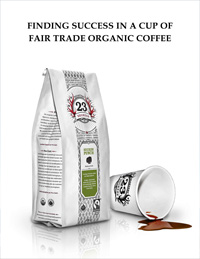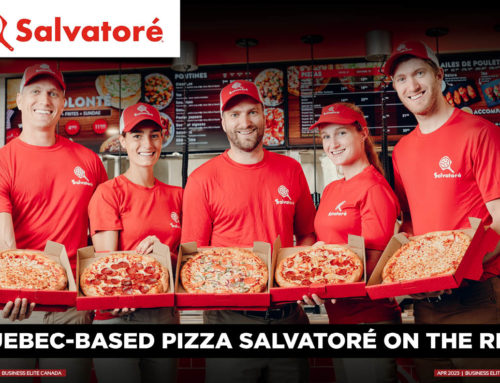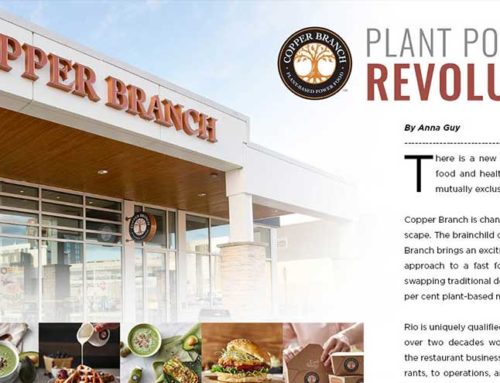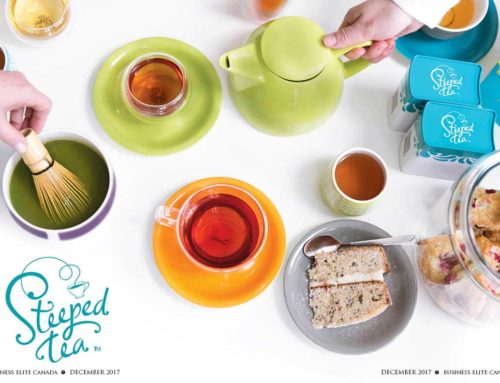Finding success in a cup of fair trade organic coffee
~ By Cheryl Long
It’s been a little more than four years since Benjamin Yu jumped into a venture that could easily rival the wine-making industry in terms of sheer complexity. In fact, few people realize that coffee can give wine a run for its money when it comes to flavor notes and aromatic compounds. Coffee is a product that is on the cusp of becoming just as revered as its grape-based cousin.
23 Degrees Roastery honours the intricacy of this popular beverage from their head office and roastery in Toronto. Even the name reflects their high level of dedication, inspired by the Bean Belt located in an area 23 degrees north and south of the equator. Today, Yu, the company’s president, devotes his days — and sometimes his nights — to bringing freshly roasted certified organic and fair trade coffee to Toronto and surrounding areas.
Yu co-founded the company with Christina Lee after years in the coffee industry, including a 10-year stint as a café owner. During that time, he noticed that most of the Canadian-produced coffee was coming from either the West or East coast, but there was nothing originating from Ontario that fell into the certified organic fair trade category. On April 1, 2011, the two launched the flagship business, immediately going after the retail sector and finding support from specialty food stores such as Whole Foods Market. Today, 23 Degrees Roastery coffee can also be found in three well-known grocery chains — Loblaws, Metro and Sobeys.
“Launching a product is one of the hardest things I’ve encountered,” Yu said. The major retail chains are flooded with product ideas every year and earning a place in the annual category review is immensely challenging. But the demand for a premium coffee, especially one that meets fair trade and organic regulations, is on the rise as customers become more quality- and ethics conscious. That means more choice than ever before, and consumers need to be aware that truly organic, fair trade coffee should be certified. 23 Degrees Roastery coffee carries the logos of two regulatory bodies— Fairtrade Canada and Pro-Cert Canada. As an offshoot of being organic, their products are also non-GMO.
Six types of coffee available
Their current product line contains six types of coffee blends, ranging from the mid-bodied Morning Star to the more intense Phoenix Rising. They also offer espresso and decaffeinated versions; their decaf coffee (wittily named Declawed) uses the healthier and environmentally friendly Swiss Water process to remove 99.9% percent of the caffeine content. They’re on the verge of launching four new SKUs, including a cold brew coffee that can be enjoyed straight from the bottle.
Offering an organic product that follows fair trade standards is important to Yu. “Coffee is the number one sprayed crop in the world with pesticides and herbicides. It’s not only our personal consumption of the chemicals, but it’s also the fact that in coffee-producing countries, the chemicals enter into the runoff water, which infiltrates and damages the ecosystem. This eventually endangers the very livelihood of the local farmers that rely on coffee for their source of income.”
Fair trade principles ensure that farmers — most of whom are living and working in developing countries — receive a fair wage for their crops. The guaranteed minimum per pound price helps to create stability and encourage sustainable agriculture in countries where the success of a crop can make or break entire families.
Though consumers are attracted to products that meet organic and ethical standards, at the end of the day much of the success 23 Degrees Roastery is enjoying comes down to taste. Part of that success can be attributed to Kathleen Holmes, the company’s head roaster and warehouse manager. Holmes uses her expertise to roast the green beans, transforming them into a multitude of strengths and flavours that must pass a rigorous testing process. Yu and his co-workers personally taste each batch, determined to deliver a consistent product. If a particular roast doesn’t meet their standards, it doesn’t go to market.
In the early days, creating the perfect roast worthy of the 23 Degrees Roastery label took a lot of trial and error. “We drank quite a bit of coffee,” Yu said, laughing. “Creating a great coffee and creating a great roast is not key here; the key is repeating it.”
Roasting beans is a science
The roasting process is a highly scientific one, requiring humidity-monitoring sensors throughout the warehouse, air flow control, and hand sorting to ensure that no foreign debris mingles with the beans. And then there’s the roast-to-order timeline, which guarantees that the beans go from green to roasted in one week.
“We like to think that our roasting process is slightly different. We pride ourselves on never over-roasting or burning the bean,” Yu explained. “We do have a slower roast process where we draw the flavours out. I believe that every roaster is going to be slightly different but it’s creating blends and profiles that other people will never be able to do.”
Though the business is still young, Yu is keenly aware of the importance of controlled expansion. After their first year, they doubled the size of their location and jumped up from a five- to 30-kilogram roaster. They’ve slowly spread their distribution from Ontario to parts of Quebec and Manitoba, and also offer their products online. The next move could see 23 Degrees Roastery coffee on the shelves in the Vancouver area.
“It’s 24/7work. We sacrifice everything for it. Anything that we make from this company we put right back into it,” Yu said. “We’re very heavy into demos. We’re out every weekend demoing the product, going into the stores and giving away free coffee. We do it all ourselves.”
Increased demand for fair trade organic
23 Degrees Roastery recently aligned with a food service company, Yu said, which will put their brand into hotels and restaurants also looking for a premium product. “Local, fair trade, and organic are the big three buzzwords when people are actually looking at products these days, and companies are realizing that. They can’t get away with distributing really bad coffee anymore because people are much more aware. You can thank Starbucks for that actually.”
Down the road, coffee lovers may find themselves walking into a 23 Degrees Roastery café. Holmes has a “good handle” on the warehouse, he said, allowing Yu the opportunity to dedicate full-time hours to the launch of a specialty café, most likely in the Toronto area. The concept has already drawn interest from potential investors.
“I like the corporate model, I like the chain model only because you have more control of your stores and more control over everything, but the franchise can work if it’s done properly.”
These days, Yu has little time to think about anything that isn’t coffee-related. Launching a successful business, and maintaining that success, is an intense process but he’s thankful for the support the business has received, from the large chains stocking their products to the consumer who purchases one bag from their favourite specialty shop. His co-workers and staff can also be proud of how far 23 Degrees Roastery has come in four years, and the role they’ve played in bringing the company to its current state.
“I’m so proud of the people that are here. Pulling together a team of people that you can work with is key to making any business successful,” he said. “You cannot do everything on your own. The people around you all have to be supportive and have to believe in the vision, and that’s hard to find.”
To learn more about 23 Degrees Roastery and their selection of certified organic fair trade coffees, visit 23degreesroastery.com.







